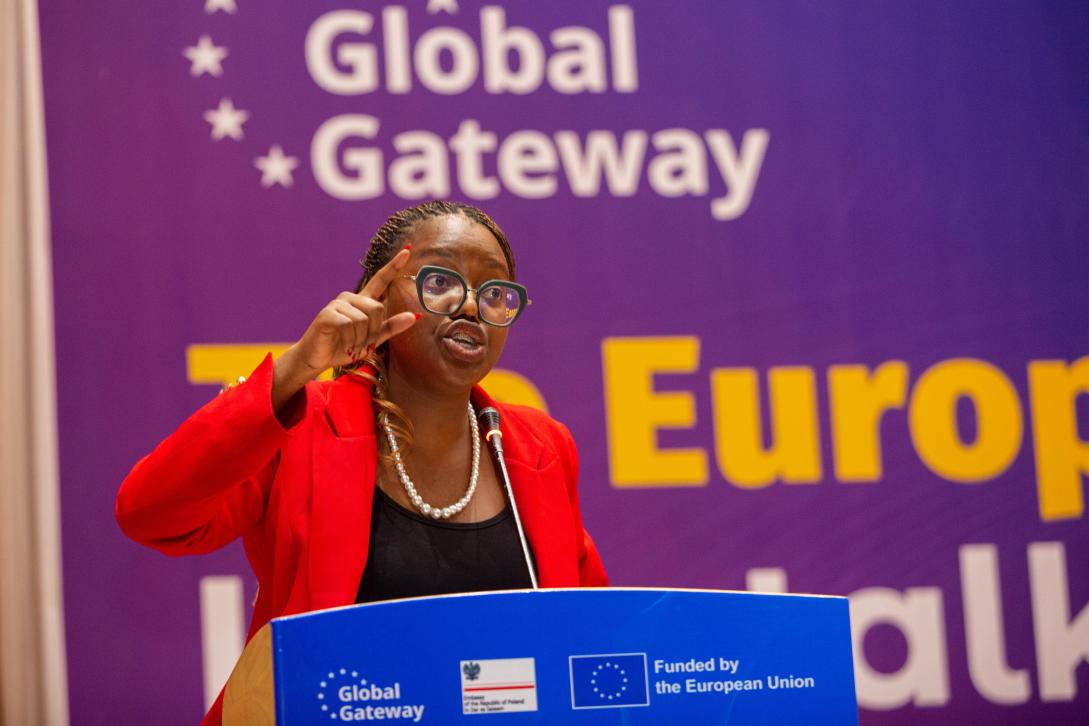EU Youth Debate Winner on Victory, Growth, and Taking the Leap

Careen Ndika sat among the finalists, the tension in the room palpable. The European Union Youth Debate Contest had been a battle of wits, a test of research, reasoning, and persuasion. She had given it her all—leading her team, Team Red, to victory while also standing out as the overall best debater. When her name was announced, she had not only secured the top spot but also won a coveted trip to Poland, alongside two other winners.
In an interview with the EU Delegation, Careen shares her experience in the contest, what she learned, and why she believes more students should step onto the debate stage.
Question: What inspired you to join the EU Youth Debate Contest?
Answer: What inspired me to join this debate contest was the opportunity to learn from different perspectives, especially from my teammates. The topic—entrepreneurship versus having a regular job—felt very personal to me. As a final-year student, this is a decision I’ve been thinking about for the past three years. Participating in this debate allowed me to engage in meaningful conversations on the subject. I found out about the competition through the university’s website and the UDSM Debating Society’s Instagram page, and I knew it would be a great opportunity to take part in.
How did you prepare for the competition?
My preparation involved two main things: research and practice.
For research, I gathered information from news websites, social media, and academic sources. But I also made an effort to ask people around me about their thoughts on the topic. After winning the second online debate competition, I set a personal challenge to ask 100 people—50 with regular jobs and 50 entrepreneurs—about what they thought was more sustainable. Although I didn’t reach all 100, I gained valuable insights into how people perceive entrepreneurship and traditional employment.
For practice, I engaged in multiple debate rounds with my teammates. These sessions helped us refine our arguments and adapt to the debate style, which significantly improved our performance.
What have you gained from this experience, and what is your general opinion of the contest?
I gained a lot from this experience. First and foremost, I developed critical thinking skills that allowed me to analyze why I hold certain beliefs—why I think entrepreneurship or a regular job is more sustainable. Additionally, I improved my public speaking skills and became more confident in presenting arguments before a large audience. I also built meaningful friendships with like-minded individuals. The 20 debaters I met were incredibly intelligent, and engaging with them, along with my teammates, was a fantastic experience.
As for the competition itself, I believe it was one of the best I have ever attended. It was well-organized and well-thought-out. We even had training sessions before the debate started, which was incredibly helpful. The opportunity to ask questions and understand the fundamentals of debating made a huge difference. I truly commend the European Union for organizing such a great event.
Did the competition help you see different perspectives on the topic?
Definitely. It challenged me to critically analyze my own views and consider opposing arguments. Listening to my opponents helped me develop stronger rebuttals and understand what truly defines sustainable income. The competition was a great exercise in broadening my perspective.
What was going through your mind when you were announced as the winner?
It was a surreal and deeply gratifying moment. I reflected on the hard work and dedication I had put into this competition from the beginning. At first, I couldn’t quite believe it, but after a few moments, I was overwhelmed with joy and gratitude for the recognition.
What message would you give to students who are hesitant about joining debate contests?
Just start—just try! It might not go perfectly the first time, but that’s okay. Everyone struggles in the beginning because debating takes courage and practice. However, over time, you gain confidence, experience, and valuable skills that help you grow as an individual.
You don’t have to be great to start, but you have to start to become great. So, take the leap, participate in debate competitions, and see how much you improve. It’s a transformative experience, and I highly encourage students to get involved.
